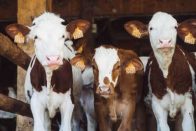The concept of eating less meat for climate change is everywhere at the moment. There are more and more headlines about people going vegan and about the negative environmental consequences of animal agriculture.
A Food and Agriculture Organisation of the United Nations report in 2006 advised that animal production contributes on a ‘massive scale’ to global warming as well as land degradation, water and energy use, deforestation and a decline in biodiversity. Animal production requires a massive quantity of water. It is estimated that 8% of the world’s human water consumption is used for livestock production. A kilo of wheat requires about 1,500 litres of water to produce while one kilo of beef requires ten times more water. Much of that water is used in manufacturing animal feed. Vegetable production requires much less water.
So here are some tips from Greenpeace
- Commit to reducing your meat and dairy consumption by a few meals per week and tell five friends about your choice to eat less meat for climate change
- Make fresh fruits and vegetables a bigger part of your diet.
- Buy sustainable or organic fresh produce whenever possible.
So next time you are planning the weeks shopping, choose a couple of veggie meals and ditch the meat for fresh veggie options.
Need some ideas for veggie meals why not try the Veggie BBQ or Veggie Meatballs
